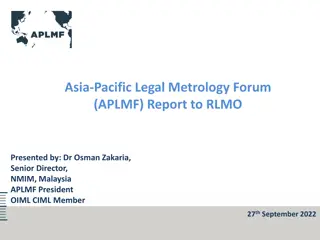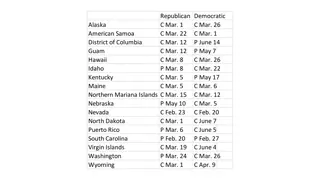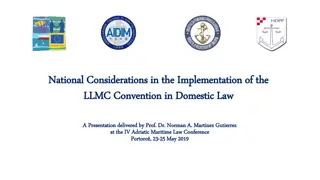Importance of Data Protection Convention 108+ for Asia
Data Protection Convention 108+ holds significance for Asia as it offers known standards, reciprocal obligations, and facilitates data flow among parties. The convention's benefits, implications, and potential Asian country adherence are explored, shedding light on the treaty's global impact and the voluntary acceptance of obligations by Asian nations.
Download Presentation

Please find below an Image/Link to download the presentation.
The content on the website is provided AS IS for your information and personal use only. It may not be sold, licensed, or shared on other websites without obtaining consent from the author.If you encounter any issues during the download, it is possible that the publisher has removed the file from their server.
You are allowed to download the files provided on this website for personal or commercial use, subject to the condition that they are used lawfully. All files are the property of their respective owners.
The content on the website is provided AS IS for your information and personal use only. It may not be sold, licensed, or shared on other websites without obtaining consent from the author.
E N D
Presentation Transcript
MINISTRY OF AGRICULTURE AND FOOD NATIONAL AGRICULTURAL ADVISORY SERVICE BULGARIAN EXPERIENCE IN RURAL DEVELOPMENT POLICY IMPLEMENTATION AND LEADER APPROACH Dr. Dimitar Vanev National Agricultural Advisory Service, Ministry of Agriculture and Food, Bulgaria Round table Improving working opportunities and living standards in rural areas in Moldova. Rural Development ahead CHISINAU, 17 MARCH 2017
Rural Municipalities in Bulgaria 231 municipalities (LAU 2 level) out of total of 264; 81% of total country territory - 90 920 sq.m. (total 111 000 sq.m.); 39% of total population - 2 841 000 (total 7 284 000); rural municipality the biggest settlement up to 30 000 inhabitants
Rural Development Policy in Bulgaria before year 2000 Lack of consistent, long-term policy approach and highly centralized decision- making; Ad-hoc reactive interventions to mitigate acute socio- economic problems; Shortage of reliable regional statistics - impossibility to identify specific local problems at central level and take corrective actions; Local authorities lacked capacity to set up (incl. programming) and to implement (including financing) appropriate development tools.
Main documents of Republic of Bulgaria for Rural Development (year 2000 up to date) National Agriculture and Rural Development Plan 2000-2006 (SAPARD Programme); National Strategy Plan for Rural Development 2007- 2013 (NSPRD); Rural Development Programme (RDP) 2007 - 2013; RDP 2014 - 2020; Ordinances for implementation of the measures under RDP; 4
Main priorities under the Rural Development Policy Implementation in Republic of Bulgaria Modernization of agricultural holdings and food- processing enterprises competitiveness and economic performance); Support for small and young farmers (improving their sustainability and economic viability); Development of advisory services and vocational training for farmers; Restoring, preserving, ecosystems related to agriculture and forestry (Agrienvironment and climate changes); (improving their and enhancing the 5
Main priorities under the Rural Development Policy Implementation in Republic of Bulgaria Economic development in rural regions: - development public infrastructure; - development basic services for the population and businesses; - capacity building, training and creation of networks for preparation and implementation of Local Development Strategies (the LEADER approach) - fostering of diversification of famers activities and development of small enterprises; 6
Basic lessons learned by RDPs implementation in Bulgaria (1) Basic prerequisites for RDP successful implementation: Applying the integrated rural development policy approach as a blend of sector-territory-community development policies; Active partnership with the economic and social NGOs and local actors as a continuous process throughout policy making and programme management: - permanent working groups by RDP measures; - regular Monitoring Committee meetings. Setting clear priorities under RDP; Permanent monitoring and implementation; Permanent development and building internal public administration expertise and capacity to implement, monitor and evaluate RD programmes. evaluation of RDP
Basic lessons learned by RDPs implementation in Bulgaria (2) Basic prerequisites for RDP successful implementation: Providing of funds and financial instruments for pre-financing of operations and investments by RDP beneficiaries; Improvement of knowledge on project implementation procedures by beneficiaries (especially for public tender procedures); Support for sustainability and integrated projects; The eligibility for recovering of non-refundable VAT; Good system and procedures for organizing and controlling the public procurement procedures under RDP project implementation; Advisory service support for preparation of RDP projects especially for small and young farmers.
Some problems under RDP implementation in Bulgaria Insufficient administrative capacity in Paying agency for processing of application forms and claims for payments; Unreasonable prices inflated prices \failure to utilize meaningful reference prices data base\; Irregular origin of equipment. Second hand equipment. Malfunctioned of Public Procurement \ 3-offers system; Setting up artificial circumstances to avoid Program conditions (for example: artificial split of one company to two linked companies both of them wanted to receive maximum support).
RECOMMENDATIONS (based on Bulgarian RDP programming and implementation experience) The very well and carefully developed written procedures (document trail and transparency) for implementation of RDP are very important; It is necessary to ensure very clear segregation of duties of all officials participating in RDP implementation; For every project must be observed 4-eyes principle; The Internal audit must be independent; Monitoring and reporting data are very important for correct decisions, they are not simply figures and numbers - If taken seriously the regular annual monitoring & reporting exercise could provide an useful approach to program review by bringing together all the important information bits generated by the various actors in the program management cycle; It is of crucial importance to involve the socio-economic partners from the Monitoring Committee in the review of monitoring and evaluation data so that program implementation is kept on track and focused on priority sectors and areas.
RECOMMENDATIONS (based on Bulgarian RDP programming and implementation experience) Close cooperation with the responsible EC officials; Co-operation between the Ministry, Paying Agency , local authorities, rural NGOs and farmers associations for the preparation of RDP; Involvement of experts with expertise on EU approaches; Development of detailed Action Plan for development and implementation of RDP with concrete deadlines, financial resources and responsible people; Regular training on public requirements for municipal and Paying Agency experts; procurement tender
What is the Community-Led Local Development / LEADER approach? Leader: Links between actions for the development of the rural economy 7 key features: Area based approach Bottom up approach Public-private partnerships (local action groups) Integrated approach (multi-sectoral) Innovation Cooperation Networking 12
Bulgarian LEADER lesson learned Importance of open, transparent and objective procedures: both for selection of LAGs and for LAG projects at local level; Need for timely decisions to avoid frustration, deception; Importance of accompanying activities for Leader: information actions, training for potential and selected LAGs, National Rural Network, access to rural credit; Applying of phased-introduction of Leader approach: capacity building / training; LAG selection; implementation of LAG strategies; co-operation . No one size fits all approach for implementing Leader - need to select conditions which are best suited to the country context.
Thank you for your attention! Dr. Dimitar Vanev Director of General Directorate Agricultural advices and Analytical Laboratory National Agricultural Advisory Service (NAAS) Ministry of Agriculture and Food (MAF), Bulgaria vanev@naas.government.bg























